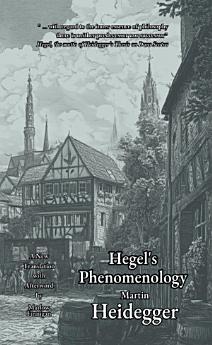Hegel's Phenomenology
About this ebook
The lecture "Hegel's Phenomenology of Spirit" was given for two hours in the winter semester 1930/31 in Freiburg, one piece in a lifeline of engagement with Hegel's works.
Heidegger analyzes the role of the Phenomenology of Spirit as the first part of Hegel's "system of science," emphasizing its foundational status in relation to the entire system. He questions the intricate relationship between the concepts of consciousness, self-consciousness, and reason, and how they interact in Hegel's dialectical process. Heidegger's discussion also touches on the nature of absolute knowledge as opposed to relative knowledge, highlighting Hegel's conception of knowledge as not merely a quantitative accumulation but a qualitative transformation.
Heidegger's analysis of Hegel's work is characterized by an in-depth consideration of the terms "absolute" and "relative" as they apply to knowledge, and their implications for the idea of spirit or "mind. He traces Hegel's dialectical method, exploring how consciousness evolves through stages of experience to reach a form of self-knowledge and ultimately absolute knowledge. This development is seen as central to Hegel's philosophical enterprise, and the Phenomenology of Spirit is seen not as an isolated work but as an essential component of Hegel's overarching philosophical system. Heidegger thus positions Hegel's Phenomenology as a crucial step in the self-development of the mind, leading to the ultimate realization of absolute knowledge. This interpretation underscores Heidegger's perspective on Hegel's methodology and philosophical ambitions, particularly in relation to the concepts of experience, consciousness, and the nature of knowledge itself.











